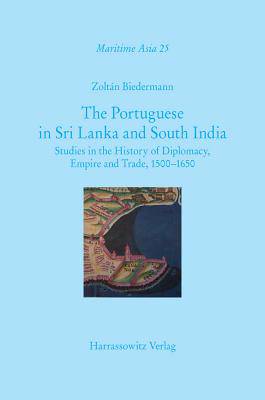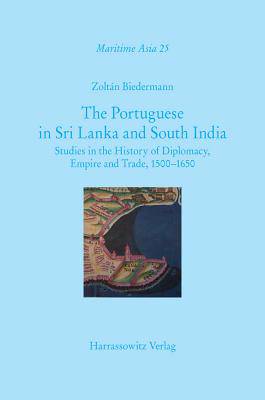
- Afhalen na 1 uur in een winkel met voorraad
- Gratis thuislevering in België vanaf € 30
- Ruim aanbod met 7 miljoen producten
- Afhalen na 1 uur in een winkel met voorraad
- Gratis thuislevering in België vanaf € 30
- Ruim aanbod met 7 miljoen producten
Zoeken
The Portuguese in Sri Lanka and South India
Studies in the History of Diplomacy, Empire and Trade, 1500-1650
Zoltan Biedermann
Hardcover | Engels
€ 127,45
+ 254 punten
Omschrijving
Zoltan Biedermann's book explores the Portuguese presence in Sri Lanka and South India with an emphasis on connections, interactions and adaptations. An introduction, six freshly revised case studies and an afterword provide historical insights into the making of Portuguese power in the region and point out new ways forward in the study of the subject. Themes explored include Portuguese diplomacy in Asia, the connected histories of Portugal, Sri Lanka and the Habsburg Empire, the importance of cartography for the development of Iberian ideas of conquest, the political mechanisms that allowed for the incorporation of Sri Lanka into the Catholic Monarchy of Philip II, and the remarkable resilience of elephant hunting and trading activities in Ceylon during the seventeenth and eighteenth centuries. A long chapter delves into the comparative urban histories of Portuguese and Dutch colonial ports in South Asia and reveals intriguing connections between colonialism, local identities and cosmopolitan attitudes. Taken together, the essays in this book question simplistic contrasts between Europe and Asia as well as between the Portuguese and the Dutch empires. The Portuguese in Sri Lanka and South Asia highlights the complex connections between the global and the local in early modern European-Asian interactions.
Specificaties
Betrokkenen
- Auteur(s):
- Uitgeverij:
Inhoud
- Aantal bladzijden:
- 205
- Taal:
- Engels
Eigenschappen
- Productcode (EAN):
- 9783447100625
- Verschijningsdatum:
- 1/01/2014
- Uitvoering:
- Hardcover
- Formaat:
- Genaaid
- Afmetingen:
- 175 mm x 244 mm
- Gewicht:
- 539 g

Alleen bij Standaard Boekhandel
+ 254 punten op je klantenkaart van Standaard Boekhandel
Beoordelingen
We publiceren alleen reviews die voldoen aan de voorwaarden voor reviews. Bekijk onze voorwaarden voor reviews.








